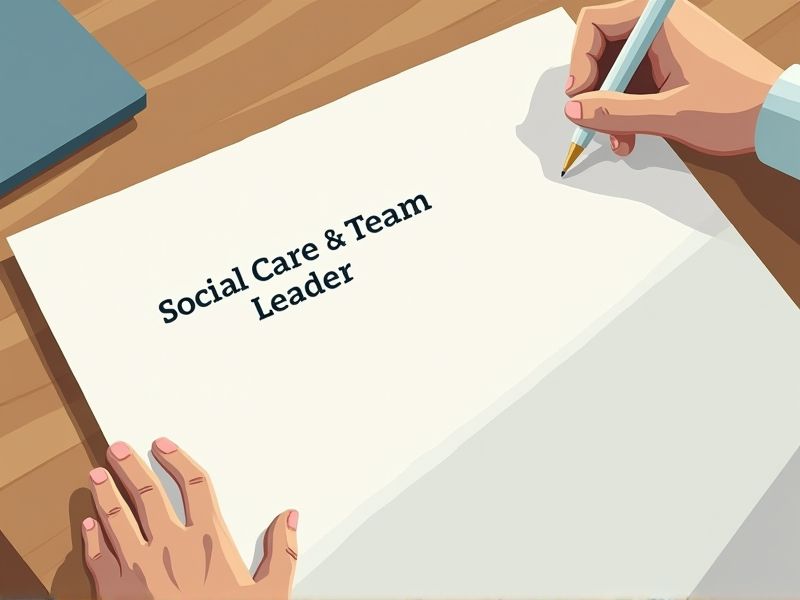
Social Care Team Leaders coordinate and oversee care services, impacting service quality and client satisfaction. Certification ensures they possess critical leadership, communication, and problem-solving skills necessary for effective team management. Regulatory bodies often mandate certifications to ensure leaders are equipped to meet legal and ethical standards in social care. These certifications are essential for a Social Care Team Leader to perform their role efficiently and with accountability.
Safeguarding Adults Certification
A Safeguarding Adults Certification ensures a Social Care Team Leader is equipped with the necessary knowledge to recognize signs of abuse or neglect. Training in safeguarding policies and procedures enables them to respond effectively to potential risks, ensuring the safety of vulnerable adults. This certification provides a framework for legal and ethical responsibilities, fostering an environment of accountability within the team. With the rise in reported cases of adult mistreatment, such certification becomes crucial in maintaining trust and safety in care settings.
First Aid and CPR Certification
A Social Care Team Leader often encounters situations where immediate medical response is crucial; being certified in First Aid and CPR equips them with the skills needed to stabilize individuals before professional medical assistance arrives. Certification ensures the team leader can provide guidance during health emergencies, fostering a safer environment for both staff and clients. Knowing First Aid and CPR builds trust within the team and community, enhancing the leader's credibility and reliability. Organizations can reduce liability risks by ensuring team leaders are trained, potentially lowering insurance costs and improving compliance with safety regulations.
Mental Health First Aid Certification
Social care team leaders often encounter individuals with mental health challenges, requiring the appropriate skills to respond effectively. Mental Health First Aid Certification equips them with the knowledge to identify early signs of mental health issues and provide initial support. This certification enhances the team's ability to address crises, potentially preventing situations from escalating. A team leader with this training fosters a more supportive environment, improving overall care outcomes.
Health and Social Care Level 5 Diploma
Obtaining a Health and Social Care Level 5 Diploma equips a Social Care Team Leader with advanced understanding of regulatory frameworks essential for ensuring compliance and high standards within the team. It enhances leadership skills, crucial for effectively managing and supporting team members as well as for fostering a collaborative work environment. The curriculum enriches problem-solving capabilities, crucial in addressing complex client needs and tailoring care plans accordingly. Possessing this qualification signifies a commitment to professional development, elevating the leader's credibility and reliability in overseeing care practices.
Leadership and Management in Social Care Certification
Social care team leaders require Leadership and Management in Social Care Certification to effectively address complex challenges inherent in client care. This certification equips leaders with essential skills to foster positive team dynamics, which directly enhances care quality. It ensures leaders stay informed about best practices and regulatory changes, leading to improved compliance and service delivery. Certification also advances career progression by demonstrating a commitment to professional development and expertise in the field.
Risk Assessment and Management Certification
Risk Assessment and Management Certification equips Social Care Team Leaders with essential skills to identify potential hazards, safeguarding both clients and staff. Understanding and mitigating risks in a structured manner enhances decision-making and promotes a safe care environment. Regulatory bodies often require certified leaders, ensuring compliance with industry standards and legal requirements. Certification provides leaders with up-to-date practices and methodologies, contributing to more effective and proactive risk management strategies.
Equality, Diversity, and Inclusion Certification
The Equality, Diversity, and Inclusion Certification equips social care team leaders with the skills to address diverse client needs, improving client satisfaction and outcomes. A team leader well-versed in these principles fosters a more inclusive work environment, reducing workplace discrimination and boosting team morale. This certification enhances a leader's ability to manage conflicts effectively, as understanding diverse perspectives aids in resolving misunderstandings. Compliance with equality and diversity regulations ensures legal protection for both the organization and its clients, maintaining trust and credibility in social care services.
Manual Handling Training Certification
Manual Handling Training Certification is required for a Social Care Team Leader to ensure the safety and well-being of both staff and clients during physical tasks. It minimizes the risk of injury, reducing workplace accidents and associated costs. Understanding proper techniques can enhance the team's efficiency and productivity. It ensures compliance with health and safety regulations, mitigating legal liabilities.
De-escalation and Conflict Resolution Training Certification
De-escalation and Conflict Resolution Training Certification empowers a social care team leader with tools to effectively manage tense situations, reducing the risk of harm to both staff and clients. With proper training, team leaders can guide their teams in maintaining a calm and safe environment, essential for fostering trust and open communication. Acquiring these skills enhances problem-solving capabilities, leading to improved outcomes in client interactions. Training certification not only boosts a leader's confidence but also promotes a professional standard that can lead to increased organizational credibility and staff morale.
Medication Administration Certification
Social care team leaders need Medication Administration Certification to ensure the safe and accurate distribution of medications to clients, minimizing the risk of errors. Certification provides them with the necessary knowledge to understand medication interactions and side effects, enhancing client safety. The certification process empowers leaders to train and supervise staff in medication management, maintaining high standards of care. Regulatory bodies often mandate such certification to comply with legal requirements and industry best practices.
Summary
When you, as a Social Care Team Leader, obtain certifications, you can enhance your leadership skills and credibility. This often leads to increased efficiency within your team, as your new knowledge directly influences better decision-making processes. Your organization may also recognize your efforts through career advancement opportunities or increased responsibilities. Clients can expect improved service quality, as certified leaders are typically more informed about best practices and current regulations.
